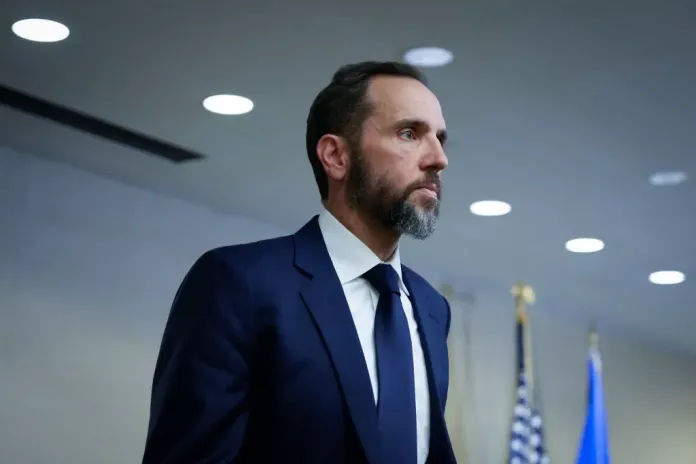Newly released internal FBI and Justice Department emails show two senior career prosecutors in 2019, during the first Trump administration, repeatedly discouraged an FBI agent from opening a criminal investigation into whether Hillary Clinton’s 2016 campaign and the Democratic National Committee improperly concealed payments that funded the Steele dossier.
The records were made public Thursday by Senate Judiciary Committee Chairman Chuck Grassley (R-IA) and include an FBI Electronic Communication dated July 2019 and email exchanges from June 5–21, 2019, involving Richard Pilger, then head of the DOJ Public Integrity Section’s election-crimes unit, and J.P. Cooney, who at the time served as chief of public corruption at the U.S. Attorney’s Office for the District of Columbia. Together, Pilger and Cooney advised against opening any investigation, according to their communications.
The emails show Pilger and Cooney repeatedly shutting down the agent’s questions about why the DOJ was not willing to investigate well-documented allegations that the Clinton campaign falsely reported payments for opposition research as generic “legal services.” Grassley said he obtained the latest information through the help of “courageous whistleblowers [who] came to my office years ago to sound the alarm that the Justice Department inappropriately interfered in efforts to investigate potential criminal activity committed by Hillary Clinton and her campaign.”
FBI Electronic Communication – Clinton Campaign by reportoftheday
The payments in question originated in 2016, when the Clinton campaign hired the law firm Perkins Coie, where Marc Elias, then-attorney of the Clinton campaign, worked, to handle election-related legal matters. Perkins Coie later contracted with Fusion GPS to conduct opposition research during the presidential race, and in mid-2016, Fusion GPS retained former British intelligence officer Christopher Steele to produce a series of memos alleging ties between then-first-term candidate Donald Trump and Russia.
In the 2019 emails released by Grassley, the FBI agent pressed Pilger and Cooney on why the Department of Justice would not authorize even a preliminary inquiry into what the agent called “unambiguous concealment” by the Clinton campaign and DNC, as by that point there had already been a complaint lobbed for failure to disclose legally required funding information since 2017. The Federal Election Commission later fined both entities in March 2022 after determining that the DNC paid $849,407. The Clinton campaign paid $175,000 to Perkins Coie for what a complaint said was Fusion GPS’s opposition research, even though the Clinton campaign reported the payments as “legal services” and the DNC described most of them as “legal and compliance consulting.”
The agent complained that Pilger’s “confrontational and condescending” tone would discourage most agents from raising questions, writing that the “chilling effect is shocking.” Pilger at one point accused the agent of “creating Jencks material” and suggested the agent could be exposed to cross-examination for supposed bias, comments the agent interpreted as a veiled warning to stop pursuing the matter.
Cooney told the agent the case was not a “good candidate” for a false-reporting investigation and argued that describing the payments as “legal services” or “consulting” created too much ambiguity to prove willfulness. No investigation was opened.
Cooney later rose to a senior post in former Attorney General Merrick Garland’s DOJ under the Biden administration as deputy to special counsel Jack Smith until he left the DOJ in January this year. Smith went on to bring two prosecutions against then-candidate Trump before he won the 2024 election, both of which ended without reaching trial.

Pilger, for his part, was also pivotal in reviewing and approving the opening of the FBI’s sweeping Arctic Frost operation, which ultimately led to a comprehensive investigation targeting Trump-aligned individuals and organizations, as revealed in recent weeks by whistleblowers and declassified records provided to Grassley. He continued to oversee investigations of federal corruption offenses within the DOJ’s Public Integrity Section until he left the department in August 2022, four months after former FBI agent Timothy Thibault initiated the Arctic Frost investigation.
Grassley argued in a statement that the records show “the same partisans who rushed to cover for Clinton rabidly pursued Arctic Frost, which was a runaway train aimed directly at President Trump and the Republican political apparatus.” He thanked Attorney General Pam Bondi and FBI Director Kash Patel for “efforts to turn over the information I requested, and I’ll continue investigating this matter.”
Despite the pushback against investigating the alleged false reporting, prosecutors have pursued other high-profile false-records cases, including the Manhattan district attorney’s conviction of Trump over narrow bookkeeping entries while he was running for reelection last year. Similar conduct arising out of the 2016 political environment also received less scrutiny.
FUNDING BILL OPENS THE DOOR TO COMPENSATE GOP SENATORS WHO SUE OVER ‘ARCTIC FROST’
Another Perkins Coie lawyer, Michael Sussmann, brought up claims about Trump-Russia ties to the FBI in September 2016 while denying he was doing so on behalf of political clients, yet he was only investigated three years later, after then-Attorney General Bill Barr appointed special counsel John Durham in 2019 to review the origins of the Trump-Russia investigation. Durham indicted Sussmann in 2021 for allegedly lying about that meeting, though a Washington, D.C., jury acquitted him in May 2022.
In a follow-up letter to the DOJ, Grassley requested that Bondi and Patel turn over all remaining records related to the matter by Nov. 27.
